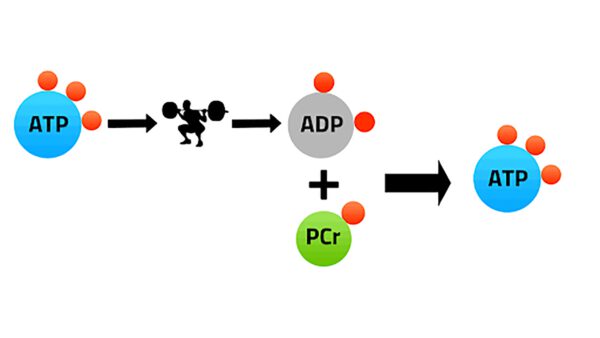The Brain-Boosting Effect of Creatine
In today's highly competitive society, many people desire a competitive edge to perform more and become better in every aspect of their lives.
Hence, various performance enhancers and brain-boosting supplements are popular among fitness enthusiasts, students, and career-driven individuals.
When it comes to supplements, no compound has been studied a thousand times for its effectiveness and safety like creatine. You may have already heard of creatine due to its popularity among bodybuilders. However, decades of studies suggest that creatine is not just a muscle-building supplement but more of an energy-building substance.
This article will discuss the brain-boosting effects of creatine and how it can help you perform better in other areas of your life.
Creatine is a naturally occurring amino acid in the body. It works by providing much-needed energy to the cells.
Adenosine Triphosphate (ATP) is the primary energy molecule used in your cells. During the process of creating energy, ATP loses one phosphate molecule, becoming Adenosine Diphosphate (ADP).
Enter creatine in its phosphocreatine form. Phosphocreatine (PCr) gives a phosphate molecule to ADP, converting it back into ATP so it can produce energy again. In essence, creatine recharges the energy molecules in your body much quicker. This is why you have more energy and accomplish more reps in the gym when you take creatine.
Just like your muscle cells, your brain cells also use energy to function, and creatine works so well in the brain by providing its necessary fuel faster—the more efficient the brain cells at producing energy, the better the brain function.
Just imagine creatine as ultrafast trucks that deliver energy to the vital parts of your brain on the busy brain highway.
Creatine allows the cells to store more energy and be readily available if needed. It is similar to a coffee's energy boost, only without the caffeine crash.
A study published by Neuroscience Research has found that creatine reduces overall mental fatigue when subjects are asked to perform mathematical calculations due to increased oxygen usage within the brain.
Creatine also improves the overall brain activity in the hippocampus, the memory center of the brain. As a result, you can improve your working memory and recall through dietary supplementation of creatine.
More importantly, a study from the UNT Health Science Center suggests that creatine can be used to fight the early stages of dementia and other age-related neurological diseases.
Creatine indirectly improves your brain performance and processing speed by supplying your neurons with enough energy throughout the day.
Creatine also demonstrates positive effects on intelligence, as seen in a study following individuals who have increased their IQ test scores by a whopping 20% after six weeks of creatine supplementation.
A workout you should try:
Creatine not only makes your memory sharper but also shows to increase your capacity to make reasonable decisions and solve complex problems. Furthermore, reasoning skills can also translate to other areas of your life, such as creative and artistic pursuits.
Having extra physical and mental energy means you can be more productive even if you have fewer hours of sleep, making it an excellent compound to counter the effects of sleep deprivation. In addition, unlike caffeine, supplementation of creatine doesn't contribute to being sluggish or agitated when sleep-deprived.
Creatine monohydrate is the gold standard available in the market and is the most studied form of creatine.
The standard dosing of creatine for its brain-boosting effect is 3 grams to 5 grams per day. High amounts of creatine intake may cause extra water retention and weight gain. Starting at 3 grams of creatine per day is recommended if you are not physically active.
If you have an underlying medical condition, it is always best to consult your physician before taking any supplements.
Creatine significantly increases energy storage in the body. This effectively improves physical strength, gives a quick boost in energy and brain function.
If you are using creatine for muscle-building purposes, you are already benefiting from its positive effects in the brain. Indirectly, many of these effects translate to development of self confidence and being productive or mentally present in your everyday activities.
Furthermore, creatine supplement shows promising results as a safe treatment for age-related neurodegenerative diseases such as Alzheimer's Dementia and Parkinson's Disease.
Frequently Asked Questions
Creatine enhances brain function by increasing the availability of energy to brain cells. It helps convert Adenosine Diphosphate (ADP) back into Adenosine Triphosphate (ATP), the primary energy molecule, thereby reducing mental fatigue and improving cognitive performance.
Yes, creatine can reduce mental fatigue by allowing cells to store more energy, making it readily available when needed. This effect is similar to caffeine's energy boost but without the subsequent crash.
Creatine supplementation has been shown to enhance memory by boosting brain activity in the hippocampus, the brain's memory center. This can lead to improved working memory and recall abilities.
No, creatine is not just for bodybuilders. While it is popular for muscle building, it also offers cognitive benefits, making it useful for students and professionals seeking to improve mental performance.
Yes, there are other supplements that can enhance brain function. For more information, you can explore the Top 3 Health Supplements to Build Lean Muscle Mass.
You can track your creatine intake and monitor its effects on your workouts and cognitive performance using the Gymaholic App, which offers tracking features and personalized workout plans.

